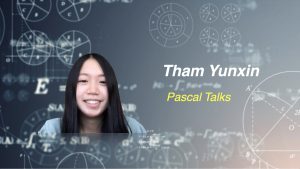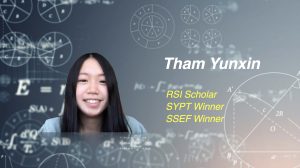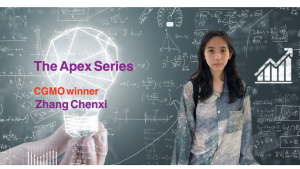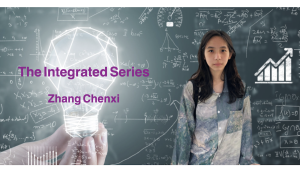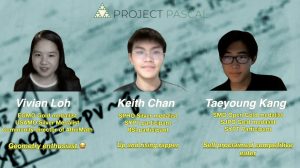Pascal Talks with “Annika Liu”
Annika developed a strong interest in experimentation and research in Y3. Since then, she has actively sought out opportunities to improve her skills and grow as a budding scientist. In her first research project at A*STAR NanoBioLab, Annika worked on synthesizing nanoparticles for solid-state electrolyte batteries. This experience fueled her desire to pursue more research opportunities.
In 2021, Annika participated in the Research Attachment Programme of the A*STAR JC Science Award, where she worked at the Institute of Microelectronics. During this program, she focused on the fabrication and evaluation of miniature solid-state pH sensors. Her work was highly successful, earning her second place in Engineering at ICYS, Gold at SSEF, and 4th Award in Chemistry at ISEF. Annika’s passion for science also led her to participate in the National STEM Talent Search 2022, where she placed third.
Overall, Annika’s research experiences have taught her important skills in flexible thinking, creativity, and scientific communication. Her passion for science has also inspired her to share her knowledge with others as she continues to pursue scientific research for the betterment of humanity.
Annika Liu Xinan (Class of 2022) realised her inclination for research towards the end of JC1.
She attributes her extensive experience and fascination with science during her secondary school years as a significant factor in her academic growth during junior college. At Raffles Girls’ School, she actively participated in a multitude of research programs, including the Odyssey program in Y2, inorganic chemistry modules in Y3, and mathematical coursework in Y4
Clearly, she explored the range of opportunities available throughout her student years, which she added was equally accessible to boys and girls. Annika firmly believes that girls today are more encouraged to take on STEM than before. Annika was inspired by her female peers, who demonstrated through their hard work and achievements that women were equally capable of excelling in scientific fields, if not more so. She described a “positive feedback loop” among women, where one’s success motivated others to follow in their footsteps.
In general, Annika’s perseverance in research was bolstered by the positive feedback she received from her teachers and peers. However, in a field where outcomes are unpredictable and returns can be erratic, her passion for the subject matter ultimately served as the primary driving force behind her continued pursuit of knowledge.
Annika first thought about scientific research in secondary school, where seniors shared their experience during sharing at Cogitare, a Math and Science academic club. Research seemed like a worthy pursuit to Annika. She was driven by the real-world applications of her research, which she found even more interesting than the theory.
Annika gained valuable insights during her internship at the Institute of Microelectronics, A*STAR. She learnt of numerous practical applications and research opportunities, including the construction of nanosensors to monitor the acidity of ocean waters. According to Annika, the field’s most enthralling aspect is the infinite potential for exploration and discovery.
Annika is confident that the skills acquired during research will continue to aid her in any future pursuits. These were mainly the capacity for flexible thinking, fostered by the need to produce results and to constantly optimise the process and the final device, and resilience, tested by the challenges of writing reports and presenting her findings.
Thoroughness certainly contributed to her success thus far, not only within her projects but also in evaluating current advances in related fields to identify key areas of concern and ensure the relevance of her work. To juniors, Annika advised that it was “important to be focused on what you’re doing […] and what you could be doing better” and to “keep asking questions you don’t know the answers to”.

